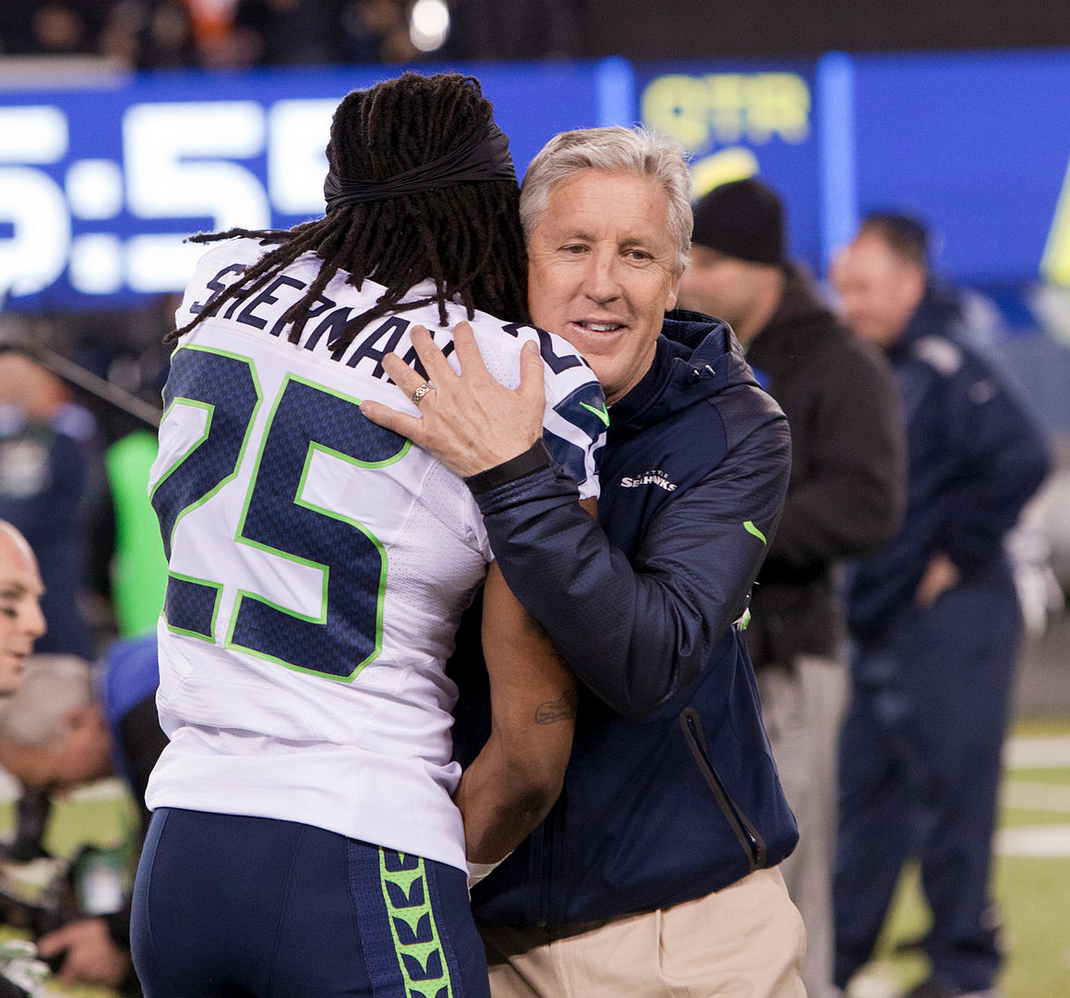“Our best selves” — Seahawks coach Pete Carroll’s lessons on football and life
Reading made me a baseball fan—thank you, Roger Angell. And it may just make me a football fan, too. Seattle Seahawks head coach Pete Carroll’s lessons on football may teach us a thing or two about life.
Angela Duckworth wrote about Carroll’s philosophy in her book Grit: The power of passion and perseverance. And I have to say, I liked what I read.

Carroll hugs his quarterback, Richard Sherman, following their 2014 Super Bowl win. Photo: Anthony Quintano – Flickr: Super Bowl XLVIII (48) New York New Jersey
Carroll has only coached one Super Bowl-winning team (so far—Seahawks, 2014), but in the last seven seasons, his teams have made the playoffs six times. That’s no accident.
Also not accidental: the philosophy he instills in his players and coaches. It’s not about winning. It’s about a passion to do your best.
When Carroll invited Angela Duckworth to come watch the Seahawks practice he promised she would see that:
“All we do is help people be great competitors. We teach them how to persevere. We unleash their passion.”
Carroll says it sometimes takes a while for new players to understand his philosophy, so he shares new thoughts about it as they arise:
“If I didn’t talk about it, they wouldn’t know that. They’d be thinking, ‘Am I going to win or am I going to lose?’ But when we talk about it enough, they come to an appreciation of why they compete.”
Pete Carroll’s lessons in etymology
You might guess that a Venn diagram of people who talk about etymology and people who work for football teams would show two completely separate circles. And you would be wrong.
One member of the Seahawks staff talked to Duckworth about the roots of the word “compete”:
“‘Compete comes from the Latin,’ explains Mike Gervais, the competitive-surfer-turned-sports-psychologist who is one of Pete’s partners in culture building. ‘Quite literally, it means strive together. It doesn’t have anything in its origins about another person losing.'”
Duckworth begins to understand the Seahawks ethos:
“…it’s not solely about defeating other teams, it’s about pushing beyond what you can do today so that tomorrow you’re just a little bit better. It’s about excellence…Reach for your best.”
Carroll’s Seahawks made the Super Bowl two years in a row. After winning the first, they lost the second in heartbreaking fashion. Commentators laid the blame squarely at the head coach’s feet, saying he had made “the worst call ever.” Duckworth tells us Carroll reframed that:
“…it wasn’t the worst decision, it was ‘the worst possible outcome.’ He explained that like every other negative experience, and every positive one, ‘it becomes part of you. I’m not going to ignore it. I’m going to face it. And when it bubbles up, I’m going to think about it and get on with it. And use it. Use it!‘”
When life is like football
One of Pete Carroll’s lessons offers a different take on the sports cliché that winning isn’t everything; it’s the only thing. Carroll says,
“If you thought of it as who was winning and who was losing, you’d miss the whole point…it’s really the guy across from us that makes us who we are.”
In Duckworth’s translation, “Our opponent…creates challenges that help us become our best selves.”
And that’s really why I turned my attention to Pete Carroll today. Not because football will be inescapable this weekend—with fans critiquing the game and non-fans critiquing the commercials. Well, okay, partly because of that.
But also because in the U.S. right now, it seems like “opponents” are everywhere. And we have a choice. We can vilify them, mock them, and cause them to dig further into their illogical ideological foxholes. Or we can recognize that while it’s no fun to be challenged, those challenges can “help us become our best selves.”
That’s what I’m striving for. In the face of “the worst possible outcome,” we must “compete”—strive together. As one of my favorite signs from the Women’s March put it:
“They tried to bury us. But they didn’t know we’re seeds.”